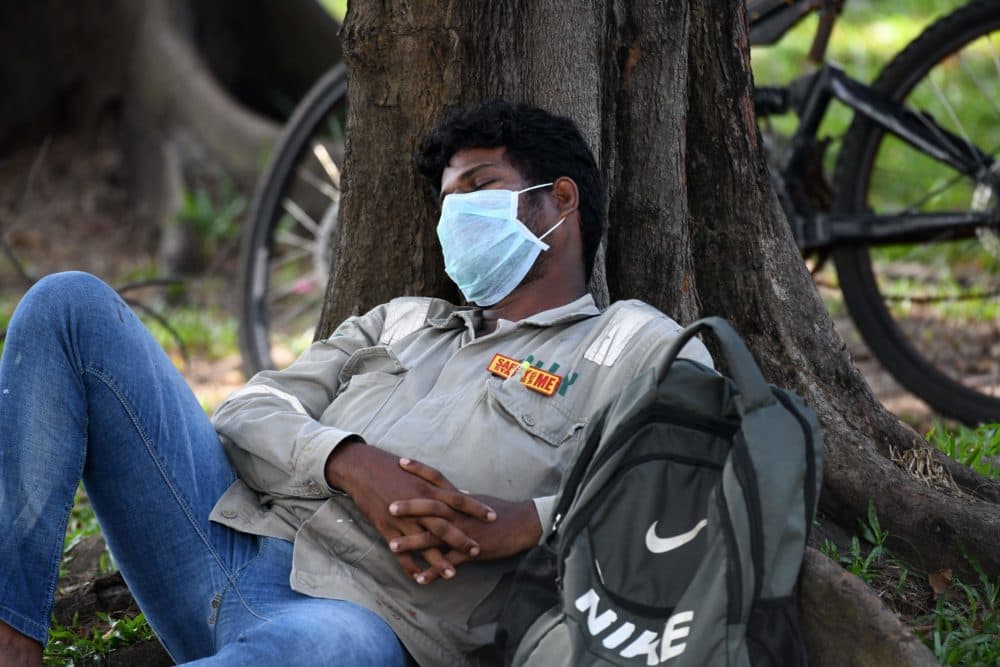Advertisement
'A Ruffled Mind Makes A Restless Pillow': Bad Dreams, Disturbed Sleep And The Coronavirus

If you’ve been having strange dreams lately — or trouble sleeping — you’re not alone.
The stress caused by the coronavirus and being holed up at home is likely to blame, says Matthew Walker, professor of neuroscience at the University of California, Berkeley and author of the book "Why We Sleep: Unlocking the Power of Sleep and Dreams.”
Many people are starting to sleep in a little bit later because they aren’t commuting to work or getting the kids ready to go to school, he says. The later into the morning people sleep, the more rapid eye movement [REM] sleep — the stage of sleep where dreams occur — they experience.
Some people might also be experiencing specific pandemic dreams, which are the body’s way of processing difficult emotions, Walker explains.
“REM sleep essentially provides the brain a form of overnight therapy [in which] dreaming helps process difficult emotional experiences,” he says. “And we can think of that dream sleep like a nocturnal, soothing balm that takes the sharp edges off the emotional concerns and experiences that we're having whilst we're awake.”
But in order to have dreams, you need to stay asleep largely throughout the night, he says. Heightened levels of anxiety during the day can disturb sleep, which British writer Charlotte Brontë described when she wrote that “a ruffled mind makes a restless pillow.”
Anxiety prevents us from falling asleep or staying asleep because it activates the “fight or flight branch of the nervous system,” which normally fades away at bedtime, Walker says.
“When you wake up in the middle of the night, typically we have this sort of Rolodex of anxiety that starts to flood back into our mind and we start to ruminate or catastrophize,” Walker says. “Unfortunately, we know that it's a two-way street as well, that if you're not getting sufficient sleep or good quality sleep, you're more likely to feel anxious the next day, and it develops this vicious cycle.”
Walker, who has struggled with insomnia in the past, says he sticks to a set of rules to help him get better sleep. The No.1 rule is regularity: Go to sleep and wake up at the same time every day.
Advertisement
Many people like to enjoy a nightcap before bed, but Walker says alcohol actually disrupts sleep, so try to avoid drinking right before bed.
“It's a sedative and sedation is not sleep,” he says. “Alcohol will actually make you wake up throughout the night, and it will also block that dream sleep that's so critical for mental health.”
Walker also puts his phone outside of the bedroom and removes clocks from the bedroom, so he’s not tempted to check the time — or the news — in the middle of the night.
“Even if you are struggling with sleep, knowing that it's 3:25 a.m. or 4:45 a.m. in the morning, it's not going to help you at that moment,” he says. “It's only going to make matters worse.”
Finally, Walker says to take a hot bath before bed, and not just because it’s soothing.
“When you get out of the bath, your core body temperature plummets,” he says. “And in fact, we know that you need to drop your body temperature to fall asleep and get good deep sleep.”
If you do wake up in the middle of the night and can’t get back to sleep after 20 minutes, Walker says get up, don’t check your phone and read a book in dim light. Don’t lie in bed tossing and turning.
“Only return to bed when you are sleepy,” he says. “You would never sit at the dinner table waiting to get hungry, so why would you lie in bed waiting to get sleepy?”
Julia Corcoran produced and edited this interview for broadcast with Tinku Ray. Samantha Raphelson adapted it for the web.
This segment aired on April 23, 2020.

